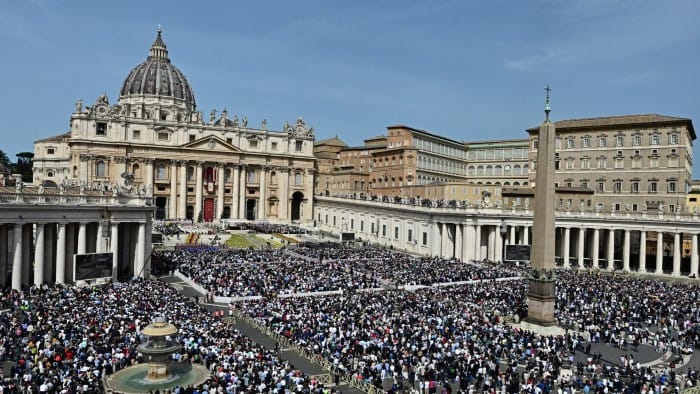Keep knowledgeable with free updates
Merely signal as much as the Synthetic intelligence myFT Digest — delivered on to your inbox.
The author is a Franciscan monk, ethics professor on the Pontifical Gregorian College and know-how adviser to the Vatican
Final summer season, leaders representing 11 world religions, from japanese faiths together with Buddhism, Hinduism, Zoroastrianism and Bahá’í to Abrahamic religions like Christianity, Judaism and Islam, gathered in Hiroshima, Japan, and signed the Rome Name for AI Ethics.
Why did the representatives of those colleges of thought, that are generally to this point aside, signal this enchantment for a humane strategy to know-how growth? As a result of they share issues concerning the methods through which humanity will probably be affected by synthetic intelligence.
I used to be current on the signing and witnessed an environment of collaboration. These current needed to contribute to a future through which no technological innovation might ever be used for mass destruction.
The second of change we face is so profound that we’d examine its alternatives and crises to the Renaissance — a time of dysfunction and transformation that destabilised the established order of the medieval world. European societies shifted from a worldview centred on Europe and the Catholic Church to a worldwide perspective, with new lands, peoples and sources. Europe’s spiritual unity fragmented and a brand new financial order weakened conventional constructions.
Within the intervening centuries, the Church has modified its view of know-how: it’s now seen as an agent of social transformation whose results have to be managed. Technological innovation is perceived as an element of social justice and never as a dogmatic concern. The Church doesn’t regard AI as a hazard (as was the case with Galileo’s telescope) however it’s prompting faiths to ask themselves as soon as once more what it means to be human and what man’s place is on this new cosmos made up of dwelling beings and clever machines.
It’s subsequently our duty to query what AI’s right use ought to be. We’re witnessing the beginning of a brand new set of creeds which might be shifting the frontier of the existential horizon. In Silicon Valley, Peter Thiel’s interpretations of the late Stanford professor René Girard counsel battle is inevitable. Elon Musk promotes so-called post-humanism, through which people merge with know-how. Pc scientist Timnit Gebru has proposed Tescreal — a neologism for philosophies that think about a way forward for enhanced people and suggests dangerous tasks are justified by the specter of human extinction.
Within the phrases of the late Pope Francis: “We’re not dwelling an period of change however a change of period.”
Francis’s successor has continued to stress the significance of AI. In one in every of his first speeches, he defined the that means behind his determination to take the identify Leo XIV. This was in reference to Leo XIII, who presided over the Church within the aftermath of the economic revolution and spoke up towards inequality and in help of employees. Pope Leo has pointed to the frontier of a brand new industrial revolution. Right this moment, it’s AI, and never meeting strains, that’s driving modern social change.
This yr, the Vatican has hosted executives from Google, Meta, Anthropic and Palantir at a convention on AI, ethics and company governance.
The Church hopes to make use of its social doctrine to guard human dignity and work. This isn’t a political ideology, however quite a theological and ethical reflection that arises from the Christian religion — a set of rules, teachings and tips developed in relation to the social, financial, political and cultural issues of the modern world. It isn’t just for Catholics however shared with the remainder of society.
In our trendy time of collective disorientation, the Catholic Church and different religions regard themselves because the companions of those that are looking for that means.

